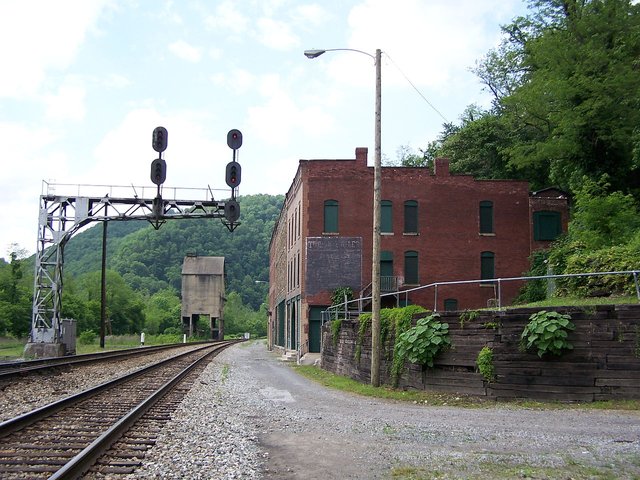The End Of The Line

An ear scratching haze of static poured out of the old cathode ray TV, its visual representation filling the dilapidated room with wandering flickers of light. Gary's face was dimly lit by the electric confetti, the tired folds of his cheeks and the bags beneath his eyes collecting resevoirs of shadow, making him appear far older than his years.
Gary's hand rested with the faintest hope on the channel knob, turning it clockwise, one heavy click at a time, finding only slight variations in the tone of the static. 34 channels of nothingness. That was the end of TV.
With a final resigned click, the screen went dark, and the abandoned room was deposited back into silence. Gary could hear his breathing again, his only sure companion in these evil times.
Gary stood up from his crouch in front of the boxy, wood cased TV, his movement mirrored in its black and white screen of thick curved glass, and looked around. A stiff breeze rustled the fine edges of dusty linens held in place on a coffee table by sunbleached, water logged books, their titles illegible.
This place was only a "house" in some technical sense. Someone had crashed something through one of the walls in the living room, taking much of the roof with it. Gary had walked right in off the street. It was a pointless miracle the TV even turned on.
Certain he would find nothing of value, Gary walked back outside the way he came, onto the wild front lawn, through brush as tall as his waist, into the jet black night. Up and down the residential street old Pontiacs, AMCs, Chevy Camaros lined the curb - some burned out husks, others just dirty, their windows shattered, fuel caps open and missing.
Gary got back to walking. It didn't matter where to. He came out of the overgrowth and onto the tattered ashphalt, his shoes kicking around wads of pebbles that used to be road.
The distance was as silent as the house had been, a stillness cut only periodically by far off gunshots, or the whispered remnants of a scream carried in the abnormally early Fall wind.
As Gary walked, his eyes readjusted to the near pitch black night. Above him, the sky was a blot of ink, only a few dull bits of light visible at the very periphery, stars peeking out from behind the great, world ending mass, now so close that it became the sky.
The ground began to quiver and then seize violently beneath Gary's feet. He bent his knees and rode the waves of the earth carefully, waiting for the fit to end. It took longer this time, but eventually settled into quiet, but not before the nearby husk of a random suburban structure crashed violently into rubble. Gary waited a long moment until he was certain it was over and then continued walking nowhere.
He felt no more remorse or anger than he'd ever felt at his fate. It was hard to maintain a sense of righteous injustice for an entire lifetime. And, anyway, who was Gary to say it was unjust? It was just the universe, just existence, playing itself out.
It gave Gary solace to consider the causal chain leading to his, personal doom. It was helpful to realize that the seeds of his destruction, the asteroid known to humanity as Galimede, was likely broken off some protoplanet billions of years ago, and quadrillions of miles away, set on its sure and irrevocable course by the vicissitudes of chance. That humanity discovered its approach in 1842 was incidental to the chain of causality.
It was easy to say the last 178 years of waiting could have changed something, had humanity planned sooner or better, instead of ignoring the problem for too long and then failing to come up with a last minute solution. Some authors postulated that the discovery of the asteroid may have actually delayed humanity's technological advancement as a species - a form of global nihilism and procrastination which retarded their development.
Gary didn't see the point in that sort of argument, having no other reality to compare his to. Nor did he think there was much value in wondering what humanity might have done differently to avoid the impending end of the world.
In fact, Gary himself was totally at ease with his fate. He had only stopped in that "house", checked that TV, in the hopes of getting a more exact timetable for impact. The prediction just said 2020, but it was February and it still hadn't happened.
But no matter. Gary looked up in the sky, addressing the agent of humanity's end, and saw that it was much bigger today then even a week ago, and getting bigger every couple of hours.
A crow landed on the roof of a Firebird and let out a singular, throaty call, before settling in to watch Gary's passage.
Gary paid the menacing bird no mind. Instead he made a little game of kicking a large pebble of dried, broken street tar ahead him, satisfied in his estimation that impact, the end, would not be long in coming.
[Photo Source]Brian M. Powell [CC BY-SA 3.0 (https://creativecommons.org/licenses/by-sa/3.0)], via Wikimedia Commons
To listen to the audio version of this article click on the play image.

Brought to you by @tts. If you find it useful please consider upvote this reply.